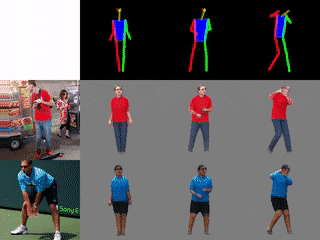This repository contains training code for the CVPR 2018 spotlight
A Variational U-Net for Conditional Appearance and Shape Generation
The model learns to infer appearance from a single image and can synthesize images with that appearance in different poses.
Project page with more results
The code was developed with Python 3. Dependencies can be installed with
pip install -r requirements.txt
Please note that the code does not work with tensorflow >= 1.3.0.
Download and unpack the desired dataset.
This results in a folder containing an index.p file. Either add a symbolic
link named data pointing to the download directory or adjust the path to
the index.p file in the <dataset>.yaml config file. To train the model,
run
python main.py --config <dataset>.yaml
By default, images and checkpoints are saved to log/<current date>. To
change the log directory and other options, see
python main.py -h
and the corresponding configuration file. To obtain images of optimal quality it is recommended to train for a second round with a loss based on Gram matrices. To do so run
python main.py --config <dataset>_retrain.yaml --retrain --checkpoint <path to checkpoint of first round>
To be able to train the model on your own dataset you must provide a pickled dictionary with the following keys:
joint_order: list indicating the order of joints.imgs: list of paths to images (relative to pickle file).train: list of booleans indicating if this image belongs to training splitjoints: list of[0,1]normalized xy joint coordinates of shape(len(joint_jorder), 2). Use negative values for occluded joints.
joint_order should contain
'rankle', 'rknee', 'rhip', 'rshoulder', 'relbow', 'rwrist', 'reye', 'lankle', 'lknee', 'lhip', 'lshoulder', 'lelbow', 'lwrist', 'leye', 'cnose'
and images without valid values for rhip, rshoulder, lhip, lshoulder are
ignored.
